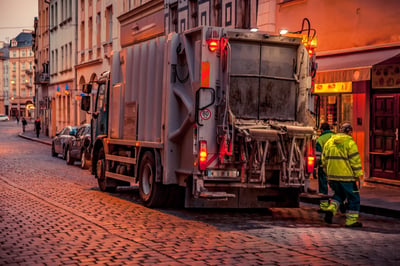
Today’s forward-thinking cities are Smart Cities. The definition will change based on what you’re reading, but boiled down, a smart city gathers and acts upon data in order to make better decisions for the communities they’re responsible for.
This data can be gathered in many ways, from citizens, devices, and sensors all connected via the Internet of Things.
Basically, it’s about harnessing technology and the massive amount of data available and making decisions based upon it to optimize for desirable outcomes. This is a mindset now widely in place across industries — and is just as applicable for cities.
Specifically? Let’s talk about the role of waste management in the world of Smart Cities.
Traditional Waste Management
Think about all the places a city has to coordinate waste pickup for. Beyond residential curbside pickup, any city will have plenty of dumpsters filling up — both in commercial and residential areas. And they’ll have a huge number of other waste disposal bins scattered around parks, streets, and other public places.
Everyone’s had the experience of trying to stuff another bag into an overfilled bin. Unfortunately, without the power of live data, a city might be able to draw up a pickup scheduled based on historic data, but it’s never going to be completely accurate.
And when we’re talking recycling, it’s vital to remove as many barriers as possible if you want people to actually do it. That means having a place for them to do it that they can rely on.
Revamping Waste Management with Data
 That’s where sensor technology can pop in to offer a whole new means of waste management. Outfit your bins with sensors that can automatically notify you when they’re getting full, and you can develop a whole new collection schedule that runs a whole lot smoother.
That’s where sensor technology can pop in to offer a whole new means of waste management. Outfit your bins with sensors that can automatically notify you when they’re getting full, and you can develop a whole new collection schedule that runs a whole lot smoother.
Not only are you simply collecting on a more efficient schedule and keeping those bins open for business, but you’re cutting down on the amount of time your waste management team needs to spend manually dealing with the repercussions of overfilled bins.
And you’re saving on all those times your haulers are heading out to collect from empty bins just because that’s when they’re on the schedule.
In short, adopting better waste management techniques through sensor technology is a serious way Smart Cities can benefit from enormous efficiencies across their vast waste collection responsibilities.
Get Set Up with RecycleSmart
We operate the largest network sensor-equipped smart containers and compactors in Canada. Our technology does just what we’re talking about here: it lets you know when your containers need attention — and when they don’t.
And we can also help get all that waste organized — which means more stuff gets recycled, and less goes to the landfill. In today’s more environmentally conscious atmosphere, that’s a must for a Smart City.
Want to learn more? Read about what we do right here.

.png?width=371&height=500&name=Untitled%20design%20(12).png)
